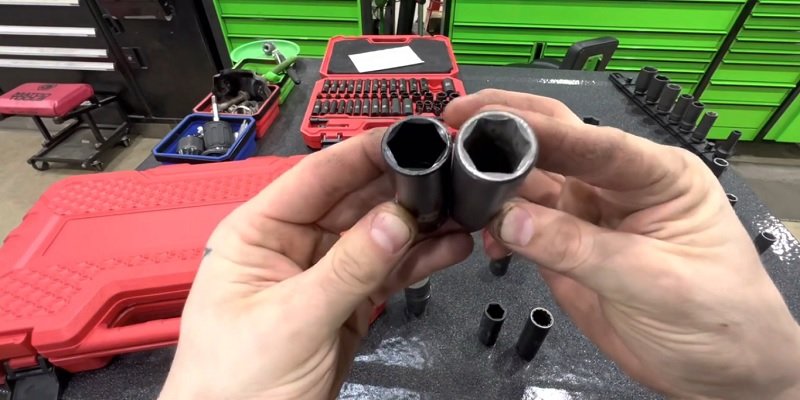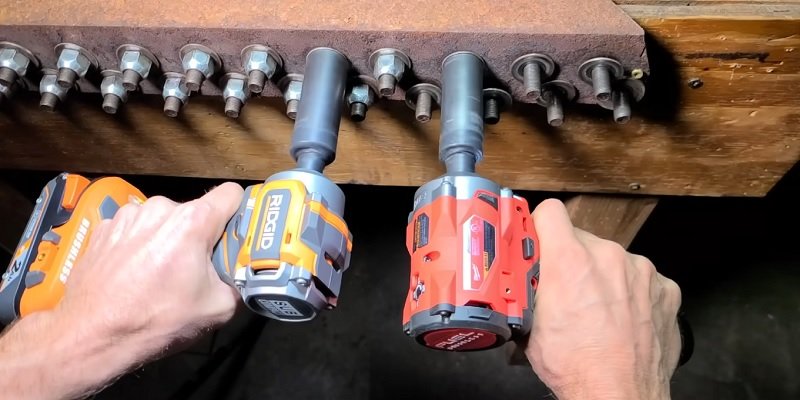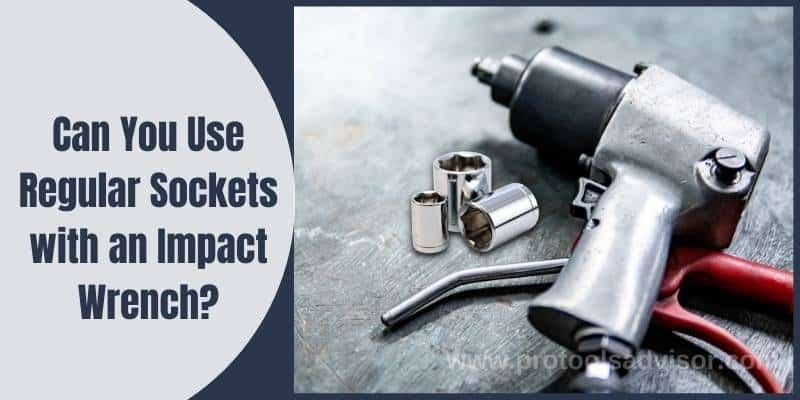Disclosure: This post contains affiliate links and I will be compensated if you make a purchase after clicking through my links. Learn More
Impact sockets are not suitable for all applications due to their limited size ranges and different design features. They are primarily designed to be used with impact drivers and wrenches for high-torque applications.
However, for regular hand tools like ratchets or wrenches, standard sockets are more appropriate because they provide a higher level of precision and accuracy. It’s essential to use the correct tools for specific tasks to ensure safety and achieve optimal results.
By understanding the differences between impact sockets and standard sockets, you can make informed decisions about which type to use for different applications.

Understanding Impact Sockets
When it comes to working with power tools, having the right equipment is crucial. Impact sockets are one such tool that is designed to withstand the high torque produced by impact wrenches and deliver optimal performance. In this section, we will delve into the world of impact sockets and provide a comprehensive understanding of their features, functionality, and when they should be used.
Impact sockets: Introduction and overview
Impact sockets are heavy-duty socket wrench attachments specifically crafted to handle the intense forces generated by impact wrenches. These sockets are designed with durability in mind and are typically constructed from high-strength steel to withstand the repetitive high-torque impacts.
As impact wrenches deliver rotational blows, impact sockets efficiently transfer this torque to fasteners without cracking or splintering under pressure.
| Key Features of Impact Sockets |
|---|
|
How do impact sockets work?
Impact sockets possess unique characteristics that enable them to withstand the intense forces generated by impact wrenches. Their thicker and sturdier walls are specifically designed to handle the increased torque produced by these tools.
The enhanced construction ensures that impact sockets can effectively transfer the rotational blows to fasteners without sacrificing their structural integrity. Additionally, impact sockets often feature a black oxide finish that reduces glare during use and protects against corrosion.
Impact sockets vs. regular sockets: What’s the difference?
While impact sockets may appear similar to regular sockets, they are engineered to handle different levels of torque and stress. The key differences between impact sockets and regular sockets lie in their construction and overall strength.
Regular sockets, although suitable for most tasks, may not withstand the high levels of torque produced by impact wrenches. Impact sockets, on the other hand, are specifically designed to handle the intense forces and repetitive impacts that impact wrenches generate.
When to use impact sockets?
Impact sockets are essential tools in situations that require the use of impact wrenches. Some common applications where impact sockets shine include:
- Tightening or loosening large fasteners with high torque requirements, such as lug nuts on vehicles.
- Working with rusty or stubborn fasteners that may require additional torque to break free.
- Heavy-duty construction projects that demand the reliability and durability of impact sockets.
- Industrial or automotive repair tasks that involve repetitive applications of high-torque forces.
In these scenarios, impact sockets provide the necessary strength and performance to tackle tough jobs effectively.
Now that we have gained a comprehensive understanding of impact sockets, their features, functionality, and best application scenarios, you can confidently harness their power and transform your projects with ease.
Impact Socket Applications In Automotive Repair
Impact sockets are a versatile tool that can be used in a variety of automotive repair tasks. Whether you are changing tires, working on suspension components, or performing engine maintenance, impact sockets can make your job easier and more efficient.
In this section, we will explore the basics of impact socket use in automotive repair and discuss specific applications for different areas of your vehicle.
Basics of impact socket use in automotive repair
Before delving into specific applications, it’s important to understand the basics of using impact sockets in automotive repair.
Impact sockets are specially designed to withstand the high-torque, high-impact forces generated by power tools such as impact wrenches. They are typically made of durable materials like chrome molybdenum steel or chrome vanadium steel, which ensure their strength and longevity.
When using impact sockets, it is crucial to choose the correct size that matches the fastener you are working with. Using the wrong size socket can result in damage to both the socket and the fastener.
Additionally, it is essential to wear appropriate protective gear, such as safety glasses and gloves, to ensure your safety while working with impact sockets.
Changing tires with impact sockets
Changing tires is a common task in automotive repair, and impact sockets are the go-to tool for this job. The high torque generated by impact wrenches allows for quick and efficient removal and installation of lug nuts. The sockets grip the fasteners securely, preventing slipping and ensuring a tight and safe fit.
Impact socket applications in suspension work
Suspension components play a crucial role in a vehicle’s handling and comfort. When it comes to working on suspension parts, impact sockets are invaluable.
They are used to remove and tighten bolts and nuts that secure various suspension components, such as control arms, struts, and sway bars. The high torque provided by impact wrenches makes the job easier and faster, saving both time and effort.
Using impact sockets for engine maintenance
Maintaining your vehicle’s engine is essential for its performance and longevity. Impact sockets come in handy when working on engine-related tasks, such as replacing spark plugs, removing and installing exhaust components, or tightening engine mounts. Their durability and high-torque capabilities make these tasks more manageable and efficient.
Impact Socket Applications In Construction And Home Improvement
When it comes to construction and home improvement projects, having the right tools is essential. One tool that can come in handy in a variety of situations is the impact socket. Impact sockets are specifically designed to withstand the high torque produced by impact wrenches, making them ideal for heavy-duty applications.
Now, we will explore the various applications of impact sockets in construction and home improvement, including their use in construction projects, woodworking, plumbing repairs, and electrical work.
Impact Sockets for Construction Projects
In construction projects, where heavy machinery is often used, impact sockets play a crucial role. These sockets are designed to handle the high torque and vibrations produced by impact wrenches, making them perfect for tasks such as tightening or loosening bolts and nuts.
Whether you are building a new structure or working on renovations, impact sockets can significantly speed up the construction process while ensuring that the connections are secure and tight.
Using Impact Sockets for Woodworking
Woodworking requires precision and strength, and impact sockets can provide both. Whether you are using a cordless drill or a power screwdriver, impact sockets can help you secure screws and bolts tightly. The impact sockets’ ability to absorb high torque ensures that your fasteners go in smoothly and without any stripping.
Impact Sockets in Plumbing Repairs
Plumbing repairs often involve working with pipes and fittings that require a significant amount of force to tighten or loosen. Impact sockets can make these tasks much easier and efficient. Whether you are repairing a leaky pipe or replacing a valve, impact sockets can provide the necessary torque to ensure a proper and leak-free connection.
Electrical Work and Impact Sockets
Impact sockets find their applications even in electrical work. While it may seem unusual, electricians often use impact wrenches with impact sockets when dealing with large electrical enclosures or tightening heavy-duty electrical connections. The high torque provided by impact sockets ensures secure connections, reducing the risk of loose connections and potential hazards.
Finally, we would say impact sockets are versatile tools that find their applications in various construction and home improvement projects. Whether you are a construction professional or a DIY enthusiast, having impact sockets in your toolbox can significantly enhance your productivity and efficiency.
From construction projects to woodworking, plumbing repairs to electrical work, impact sockets provide the necessary torque and strength to get the job done right.
Benefits And Limitations Of Impact Sockets
When it comes to using tools for various projects, impact sockets are a popular choice for many professionals and DIY enthusiasts. These versatile tools are specifically designed to withstand the demanding force generated by impact wrenches, ensuring efficient and accurate results.
However, like any tool, impact sockets also have their own set of benefits and limitations that should be taken into consideration. In this article, we will explore the advantages of using impact sockets, as well as the limitations and precautions one should be aware of.
We will also discuss the suitability of impact sockets for lightweight applications and provide some essential safety tips to ensure a smooth and secure working experience.
Advantages of using impact sockets
Impact sockets offer several key advantages over standard sockets, making them an invaluable tool in many professional environments. Some of the significant advantages of using impact sockets include:
1. Strong and durable construction: Impact sockets are specifically designed to handle the high torque generated by impact wrenches. They are constructed from high-quality materials such as chrome molybdenum steel or chrome vanadium steel, which provide exceptional strength and durability.
2. High torque transfer: Impact sockets have a unique design that allows for increased torque transfer, ensuring better power delivery to the fastener. This results in faster and more efficient tightening or loosening of bolts and nuts.
3. Enhanced socket engagement: Impact sockets feature a deeper and thicker socket wall compared to standard sockets. This provides better engagement with the fastener, reducing the risk of slipping or stripping the bolt or nut.
4. Versatility: Impact sockets can be used with both manual and power tools. They are compatible with impact wrenches, air ratchets, electric drills, and other tools, allowing for a wide range of applications.
Limitations and precautions when using impact sockets
While impact sockets offer many advantages, it is important to be aware of their limitations and take necessary precautions when using them. Some limitations and precautions to consider include:
Excessive torque can cause damage: Impact sockets are designed to handle high torque, but it is essential to avoid overloading them. Excessive torque can cause sockets to crack or shatter, leading to potential hazards. Always follow the manufacturer’s guidelines for torque limits.
Not suitable for precision applications: Due to their design and high torque transfer capabilities, impact sockets may not be suitable for precision applications that require controlled tightening or loosening. In such cases, using a torque wrench or specialized sockets is recommended.
Potential for fastener damage: Impact sockets may forcefully remove or tighten fasteners, which can result in damage to the fastener head or threads. To minimize the risk of damage, ensure the socket size matches the fastener size properly and use the correct impact socket for the job.
Wear appropriate personal protective equipment (PPE): When using impact sockets, it is crucial to wear safety glasses, gloves, and other necessary protective equipment. This will protect against potential flying debris, sparks, or accidental contact with rotating parts.
Impact sockets for lightweight applications
While impact sockets are primarily designed for heavy-duty applications, they can also be used for lightweight tasks with caution. When using impact sockets for lightweight applications, keep the following considerations in mind:
Careful torque control: For lightweight applications, it is important to exercise caution and apply torque gradually to avoid overloading the fastener or causing damage. Use lower torque settings on the impact wrench and ensure proper alignment of the socket with the fastener.
Select the right socket size: Choose the correct socket size that matches the fastener to prevent any slippage or damage. Using a socket that is too large or too small can lead to ineffective or unsafe results.
Assess the impact force: Lightweight applications may not require the full force generated by an impact wrench. Consider adjusting the impact wrench settings or opting for a lighter-duty tool if necessary.
Safety tips for using impact sockets
While working with impact sockets, safety should always be a top priority. Follow these essential safety tips to ensure a secure and hassle-free experience:
Read the manufacturer’s instructions: Familiarize yourself with the manufacturer’s guidelines and instructions for using impact sockets. This includes information on recommended torque limits, proper usage, and maintenance.
Inspect sockets before use: Before using impact sockets, carefully inspect them for any signs of damage, such as cracks or wear. Damaged sockets should not be used, as they can pose a safety risk.
Securely fasten sockets: Ensure that the impact socket is securely attached to the impact wrench or power tool. Loose or improperly fastened sockets can lead to accidents or injuries.
Use impact-rated accessories: Use impact-rated extensions, adapters, and accessories designed to handle the high torque of impact tools. Standard accessories may not withstand the force generated, increasing the risk of breakage or accidents.
Maintain a stable working environment: Work on a stable and secure surface to minimize the risk of accidents or injuries. Avoid working in wet or slippery conditions and use appropriate safety measures, such as securing the workpiece.
By understanding the benefits and limitations of impact sockets, and adhering to proper safety precautions, you can make the most out of this powerful tool while ensuring a safe and efficient working environment.
Choosing The Right Impact Sockets
Understanding Impact Socket Sizes and Measurements
When it comes to choosing the right impact sockets, understanding the different sizes and measurements is crucial. Impact sockets are available in a range of sizes, including metric and standard sizes. The size of an impact socket refers to the socket’s inner diameter, which is designed to fit the corresponding size of bolts or nuts.
Furthermore, impact socket measurements are represented in both inches and millimeters. Metric measurements are commonly used in applications that follow the International System of Units (SI), while standard measurements are more prevalent in the United States. It’s essential to know which measurement system is appropriate for your specific task to ensure compatibility with your impact wrench or driver.
Different Types of Impact Socket Materials
Impact sockets are made from different materials to meet various strength and durability requirements. Some of the most common materials used for impact sockets include:
Chrome Molybdenum Steel: Known for its excellent strength and impact resistance, chrome molybdenum steel is a popular choice for impact sockets. It is suitable for heavy-duty applications and offers long-lasting performance.
Chrome Vanadium Steel: This material combines strength and affordability, making it a versatile option. Chrome vanadium steel impact sockets provide exceptional durability while being more budget-friendly compared to chrome molybdenum steel.
Carbon Steel: Carbon steel impact sockets are often preferred for lighter applications, offering a balance between strength and cost-effectiveness.
Factors to Consider When Selecting Impact Sockets
Choosing the right impact sockets involves considering several factors to ensure optimal performance and safety. Here are some essential factors to consider:
Socket Compatibility: Ensure that the impact sockets you choose are compatible with your impact wrench or driver.
Socket Size Range: Evaluate the size range provided by a socket set to ensure it covers your specific needs for different bolts and nuts.
Durability: Select impact sockets made from high-quality materials that can withstand the high torque and vibrations produced by impact wrenches or drivers.
Markings and Identification: Look for impact sockets with clear and easily visible size markings to facilitate quick identification and selection.
Cost: Consider your budget and choose impact sockets that offer the right balance between quality and affordability.
Impact Sockets for Specific Tasks
Depending on the task at hand, you may need impact sockets designed for specific applications. Here are a few examples:
| Task | Recommended Impact Socket Type |
|---|---|
| Tire Changes | Thin-walled impact sockets designed for use on lug nuts |
| Heavy Machinery Repair | Deep impact sockets for accessing recessed bolts in tight spaces |
| Construction Projects | Impact sockets with a protective coating to prevent rust and corrosion |
By selecting the appropriate impact socket for your specific task, you can ensure efficient and reliable performance while minimizing the risk of damage or accidents.
Frequently Asked Questions Of Can I Use Impact Sockets For Everything?
Can Impact Sockets Be Used For All Types Of Repairs And Maintenance?
Impact sockets are specifically designed for use with impact wrenches, making them ideal for high-torque applications. They are commonly used for automotive repair and maintenance tasks, but can also be used for other applications that require high torque, such as construction and industrial projects.
What Are The Advantages Of Using Impact Sockets?
One major advantage of using impact sockets is their durability. They are built to withstand the high torque produced by impact wrenches, making them less likely to strip or break compared to regular sockets. Furthermore, impact sockets have a thicker wall, which allows for better torque distribution and reduces the risk of socket distortion.
Can I Use Impact Sockets With A Regular Ratchet Or Breaker Bar?
While impact sockets are designed for use with impact wrenches, they can also be used with a regular ratchet or breaker bar. However, it’s important to note that the benefits of impact sockets, such as their durability and torque distribution, may not be fully realized when used with non-impact tools.
Final Thoughts
Impact sockets are a versatile tool that can handle a wide range of tasks. From automotive repairs to construction projects, impact sockets provide the necessary strength and durability to get the job done. While they may not be suitable for every occasion, their versatility makes them a valuable addition to any toolkit.
With the right selection of impact sockets, you can take on various tasks with ease and efficiency. So, next time you’re faced with a challenging project, consider reaching for your impact sockets for a job well done.


